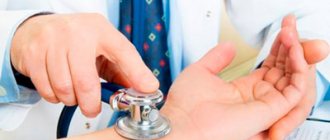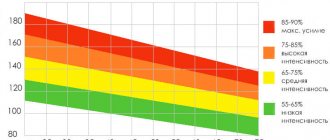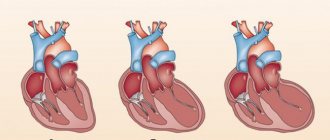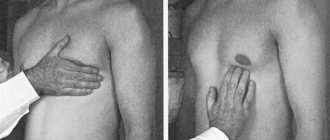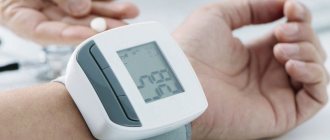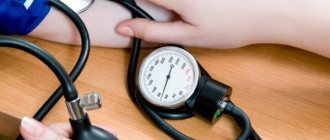Palpitation is a sensation of fluttering or pulsating in the area of the heart. The feeling of palpitations can be caused by a stressful situation, physical activity, medication, or, in rare cases, a person's health condition.
Although the sensation of heart palpitations can be distressing, it usually does not pose a risk to human health. In rare cases, palpitations may be a symptom of a more serious heart condition such as an irregular heartbeat (arrhythmia), which may require treatment.
Psychological reasons
The main psychosomatic causes include:
- emotional stress;
- depression;
- panic attacks;
- stress.
Indeed, in an anxious state, a person’s heart begins to work faster, and consequently, symptoms such as sweating, tremors, shortness of breath appear, and, of course, the body gives a signal in the form of a palpable heartbeat.
If you feel your heart beating and all possible diseases have been ruled out, there is another way to solve the problem - eliminating stress and conflicts. If the cause of your palpitations is psychosomatics, then you should change your lifestyle. Give up stressful work, change or expand your social circle, try to eliminate any stress.
Consider adopting new healthy habits, such as walking in the fresh air, playing sports, or visiting health resorts. If possible, go to the sea to breathe the salty air. Take a course of massage, electrophoresis. Give up bad habits: smoking, drinking coffee or tea, energy drinks that stimulate the nervous system, and, of course, overeating. If your heart palpitations are caused by illnesses such as a panic attack or depression, consult a psychiatrist. These ailments are treated with medication.
Causes of palpitations, extrasystoles, arrhythmias
There are many reasons for the occurrence of such symptoms as rapid heartbeat, extrasystole or cardiac arrhythmia. This can be physical activity, especially in untrained people or overweight people, various diseases of the cardiovascular system, and most often these symptoms indicate the presence of a nervous system disorder and can be justified by the presence of neurological or borderline mental disorders.
Possible complaints with palpitations, extrasystole, arrhythmia
- Feeling of constant or frequent anxiety.
- Nervousness and internal trembling.
- A feeling of constant or frequent fear.
- Strong, rapid heartbeat or extrasystoles.
- Feeling tense or on edge.
Palpitations are one of those symptoms that may indicate the presence of various pathologies (mental disorders, diseases of internal organs). One of the most common causes of the sensation and manifestation of rapid heartbeat or arrhythmia is a disorder or imbalance between the central and autonomic nervous systems. Often such symptoms are referred to as paroxysmal tachycardia.
How do palpitations, arrhythmias, and extrasystoles manifest?
1. Patient: Male, 36 years old, no bad habits, goes in for sports, leads a healthy lifestyle. I consulted a cardiologist, who after an examination referred me for treatment to a psychiatrist and psychotherapist. The patient’s own complaints looked like this: “Recently there was a palpitation with a feeling of arrhythmia. At work I was a little nervous, then I felt pain under my shoulder blade, I was afraid that my heart was hurting, and then I felt a strong heartbeat. Then he tried to calm down, but the heartbeat did not go away. I asked a colleague to take me to the hospital. There the doctor did an examination, took an ECG, measured my blood pressure (it was 160/90, heart rate 130-140). He said that according to the ECG it is either sinus tachycardia or supraventricular paroxysmal tachycardia, arrhythmia. He gave me anaprilin and sent me home. The next day I went to work, constantly listened to my heart, was afraid of a new attack and it happened again. I called an ambulance, measured my blood pressure (160/120), injected me with magnesium and left. After that I began to be very afraid of heart attacks
, I constantly measure my pulse and blood pressure. Usually the normal pressure is 120/70, but sometimes it is 140/100 and 100/60. When I go up the steps, my heart beats strongly and in the morning the heart rate is 80-95, and in the evening it is 60-65. Now I have heart palpitations at home, the first one happened when I was home alone. Thinking that I was going to feel bad and that no one was there, my heart began to pound, I took my blood pressure and it was 170/100. I took anaprilin and after a few minutes the pulse calmed down and the pressure became 130/90.”
A psychotherapist diagnosed the presence of anxiety-depressive syndrome. A comprehensive course of therapy was carried out for one month. After treatment, the patient does not complain about palpitations, fears or other negative symptoms. It is recommended to consult a psychotherapist once every 3 months for a year. The patient was observed for two years; no relapses or worsening of the condition were detected. It is recommended to follow a daily routine and diet; if the condition worsens, contact a psychotherapist.
2. Patient: Female; 39 years old, smokes 0.5 packs a day, alcohol on holidays and weekends, no drugs. Married, one child, resident of a large city. Business owner. She was observed for a long time by a cardiologist for palpitations. I went to see a psychotherapist at the insistence of a friend. Description of the situation by the patient himself: “I have a problem with a rapid heartbeat. This began to manifest itself strongly in the last two years; before that, for about 10-12 years, this sensation was present after any physical activity, during anxiety, and after eating food. But I tried not to pay attention and took it off with valerian or valocordin, which used to help me. Now I constantly have a rapid heartbeat; I feel my heart beating all the time, both in a calm state and with the slightest physical activity (even if I’m doing simple cleaning in the apartment). Very often I began to feel either a slowdown or, on the contrary, an increase in the heartbeat; there were, as it were, dips when the heart stopped working altogether. I read it on the Internet, they say it’s an arrhythmia.
I was examined by a cardiologist more than once, they did an ECHO, Holter monitoring, and an ECG. Conclusion: sinus rhythm 86 beats/min. Deviation of EOS to the left, disturbance of intraventricular conduction in the left anterior branch of the His bundle. Changes in the myocardium. Grandaxin was prescribed. They said that this feeling was not from the heart and sent me to an endocrinologist. I was examined by an endocrinologist, I have been taking L-thyroxine 50 mg for 6 years, the conclusion is chronic autoimmune thyroiditis, hypothyroidism is compensated for with medication, the endocrinologist also said that this condition does not depend on the diagnosis or on medications, contact a neurologist.
She turned to a neurologist, was treated as an inpatient at the Central Clinical Hospital of the Russian Academy of Sciences in Moscow in neurology, conclusion: Main: Central Vascular Hospital. Stage 1 dyscirculatory encephalopathy with vertebrobasilar insufficiency, subcompensation. Common dorsopathy with muscular-tonic syndrome. Tension headaches. In the hospital I took fevarin, atarax, concor, intravenous magnesium sulfate, mexidol, pentoxifylline. She underwent a course of acupuncture, massage, and darsonvalization of the scalp. After discharge, it was a little better for a few days, and then everything came back. It was as if she had not been treated at all. Then I drank fevarin, concor, anaprilin for 6 months, drank atarax for 1 month, then I was prescribed Paxil, clonozepam, glycine for another 6 months. MRI revealed: osteochondrosis of the cervical spine and hernia of the lumbar spine. There are no improvements, my heart is pounding even more, it feels as if everything inside me is trembling, I’m irritable, emotional, tearful, I have trouble falling asleep and sleep very poorly, often I can’t sleep until the morning.
Heart beats vary: 70-75-85-106 per minute, but the feeling of rapid heartbeat is always present. She was also treated with homeopathy, drank brewed valerian roots, tinctures of motherwort, peony, and hawthorn. Sorry for such a detailed description, but it hurt a lot, I don’t know what to do next, maybe I shouldn’t drink anything at all, because there are so many side effects! And the results from all this treatment are minus ten! Because it gets worse and worse all the time! I feel arrhythmias every day, several times a day. The TSH level has risen, the heart is pounding harder and harder and jumping out of the chest, and there is no change for the better.”
Help was offered from a psychiatrist and psychotherapist. The examination revealed the presence of anxiety-depressive syndrome, complicated by autonomic dysfunction. To exclude possible heart pathology, a more in-depth functional diagnosis of the cardiovascular system was carried out, in which no pathology was found. Intensive therapy was individually selected and carried out in a day hospital for three months, with transition to outpatient treatment and observation. After a month of treatment, all complaints of palpitations stopped. The treatment lasted 14 months. No relapse or worsening of the condition has been observed for more than three years.
Treatment of Anxiety Disorders
Normal heart condition
Before we look at the main medical reasons why a person can feel their heartbeat, it is worth deciding how many heartbeats there should be on average per minute. The heart is a biological engine for the distillation of blood. In order to saturate the cells of organs with oxygen, the heart works continuously throughout life. It has three states: relaxation, atrial contraction and ventricular contraction. Normal heart rate is approximately 60-80 beats per minute.
Going beyond these indicators is a deviation. There are external reasons why the number of heart beats may increase or decrease. You can feel the heart beating just by putting your ear to your chest, or using a phonendoscope. You need to measure your pulse at rest. Before this, you need to clarify the patient’s well-being and his diagnosis. The pulse depends on the time of day, temperature and humidity, the mood and mental state of a person, and age.
As already mentioned, in an excited emotional state, the number of heart beats per minute in a person increases. When the temperature rises, the heart rate also increases, and when the temperature drops, it slows down. Children tend to have a much faster pulse than adults. It can be up to 120 beats per minute, but with age it decreases and at the age of 15, during teenage puberty, it returns to normal - 60 beats.
You can learn to feel your body
Interoceptive ability was previously thought to be immutable, but Garfinkel believes it can be developed. She tried to teach people to become more aware of their heartbeat and claims that those who succeeded in this began to experience fewer symptoms of anxiety.
Khalsa also began treating people suffering from anxiety and panic attacks through interoception. He called his method interoceptive exposure. Its essence is to relieve patients from feeling threatened when experiencing sensations that usually cause anxiety.
Garfinkel believes that interoceptive exposure can also help people suffering from psychosis. Khalsa agrees: “Patients with schizophrenia often experience visual and auditory hallucinations, which means their perception is focused on the external world, which in turn affects the ability to concentrate on what is happening internally.”
Atrial fibrillation
The most common abnormality in the field of cardiology is atrial fibrillation. It is determined by the following symptoms: the heart either stops, then starts beating sharply, as if you had just run a cross-country race. A person hears the sound of a heartbeat. The main symptoms also include difficulty breathing, dizziness, and chest pain. Often the disease is asymptomatic, which is a more dangerous condition for a person, because not diagnosed in time can cost health or even life.
If we talk about the physiological features of this disease, then instead of a full contraction of the atria, fibrillation occurs, that is, incomplete contraction, while the ventricles of the heart contract to 160 beats per minute. This is very dangerous for the heart, as it experiences incredible overload. The first symptoms may occur during times of stress. The consequences of the disease manifest themselves in the form of strokes, heart attacks and various heart diseases. If the sound of the heartbeat is noticeable even at rest, this is a serious signal from the body.
The main causes of arrhythmia are hereditary or congenital heart disease and valve disease. Another cause is coronary heart disease. Also, improper functioning of the organs responsible for hormones affects the heart muscle.
Like any disease, arrhythmia is better prevented than treated. Heart health is affected by a person's lifestyle. Play sports, get rid of bad habits that have a detrimental effect on the heart, worry less and you will never know what it means to feel your heartbeat in a calm state.
Why is the problem disturbing?
Hormonal disbalance
If the patient’s heart is pounding strongly, even when he is at rest, then you can contact an endocrinologist. More often, strong blows and heavy breathing are associated with impaired functioning of the thyroid gland, which produces insufficient or excessive amounts of certain hormones. Thyroid dysfunction can be provoked by constant stress, psycho-emotional tension and other unfavorable factors. An unpleasant feeling worsens with anxiety or nervous tension. The feeling of rapid heartbeat with a normal pulse goes away only after the functioning of the thyroid gland is normalized.
Often the patient can feel the pulse and hear the heart beating due to diffuse toxic goiter, which increases the sensitivity of the blood vessels.
Impaired cardiovascular function
A rapid heartbeat with a calm pulse can be a consequence of the development of various vascular diseases. Constant strong heartbeat is often associated with pathological processes such as:
An increased heart rate with a normal pulse may be associated with arrhythmia.
- Arrhythmia. In this case, the patient experiences an acceleration of the pulse. The pathology is accompanied by disrupted cardiac impulses, which causes an uneven heartbeat.
- An infectious focus in an internal organ. In medicine, such conditions are known as myocarditis and endocarditis. If there is a deviation, you not only feel your heart pounding, but you also experience fever and a change in skin color. Against the background of pathology, the functioning of other internal organs is often disrupted.
- Changes in heart tissue. Deviations are often explained by the development of myocardial dystrophy or cardiosclerosis.
- Heart defect. The heartbeat is felt with such a disorder, which may be congenital or acquired.
- Constant high blood pressure. In a healthy person, blood pressure levels are within the range of 120 to 80 mm Hg. Art. When they increase, hypertension is recorded, which is accompanied by headache and dizziness.
Return to contents
What other reasons are there?
A loud heartbeat and normal pulse may indicate other problems, including:
- vegetative-vascular dystonia of various types;
- high body temperature;
- decreased hemoglobin level;
- neurosis.
Women may feel a pathological condition during menopause.
In women, a feeling of palpitations against the background of a normal pulse can be observed during menopause, while the patient complains of other unpleasant symptoms, such as pain in the head, weakness. You can often feel your heart beating when you are physically tired or stressed. Intoxication of the body can also contribute to the development of the disorder. In this case, it is enough to eliminate the provoking factor, and the signs of heavy heartbeat will go away on their own.
Treatment of atrial fibrillation
Before starting treatment, it is necessary to determine the source of the disorder, namely with the interruption of which valve or ventricle it is associated with. It is necessary to completely examine the entire cardiovascular system. The course of treatment consists of lifelong observation by a cardiologist, drug treatment, and, in some cases, surgical procedures. Most often, arrhythmia is classified as a chronic pathology, and surgical intervention is rarely required. It is necessary for people with congenital heart disease and is performed in children under 14 years of age when drug treatment is ineffective.
Diagnostic procedures
Regular feeling of a strong heartbeat with a normal pulse requires contacting a cardiologist. The specialist finds out what other symptoms are troubling the patient and prescribes manipulations that help establish an accurate diagnosis, such as:
- electrocardiography;
- diagnostics of the heart and other internal organs using ultrasound;
- general laboratory blood test;
- hormone analysis;
- daily monitoring of heart rate and blood pressure.
To find out the cause of the feeling of palpitations with a normal pulse, it is often necessary to undergo a magnetic resonance or computed tomography scan. If necessary, additional consultation is carried out with an endocrinologist, psychotherapist, psychiatrist and other highly specialized doctors. Only after identifying the source of the disorder, the doctor selects the optimal treatment or prescribes lifestyle correction.
Tachycardia is the main cause of severe pounding in the chest
The second most common heart disease is tachycardia. Normally, at rest in an adult, the number of beats per minute should be up to 80 times. But if you find that the number of beats is 100, then quickly make an appointment with a cardiologist. Due to intense work, the heart beats harder and, as a result, is more noticeable to a person.
If the number of beats exceeds this norm, this is one of the signs of tachycardia. Naturally, the disease negatively affects the functioning of the heart - the ventricles do not have time to fill with blood, so there is a deterioration in the blood supply to organs and tissues, and as a result, there is a lack of oxygen.
As a rule, the cause of tachycardia and a constant feeling of palpitations are excessive physical exertion, sunstroke, and diseases of the body, both infectious and viral. Treatment is very simple if you consult a doctor in time. If the necessary drug treatment is provided, heart problems should not arise. After a certain period, tachycardia, if left untreated, becomes chronic, which leads to a worsening of the condition, a person feels the heart beating more strongly, heart disease and inflammation of the myocardium appear.
To summarize, we determine that tachycardia is the main cause of a strong heartbeat, as a result of which a person can hear his own beats. From this we conclude that normally a person should not hear his own heartbeat.
Low attention to body sensations is associated with dissatisfaction with it
University of London neuroscientist Manos Tsakiris has found a link between low interoceptive ability and dissatisfaction with one's appearance, even with a normal body mass index.
People who have difficulty feeling their heartbeat also have an increased tendency to objectify their body. “In other words, they tend to think about their bodies not in terms of health, but in terms of attractiveness,” he says.
Tsakiris plans to conduct an experiment to measure interoceptive ability and body satisfaction among girls before and after they reach puberty to see how these indicators change. He suggests that girls with better interoceptive ability go through the maturation process more smoothly and do not have problems with body image later in life.
Other reasons
Non-cardiological causes of palpitations in the chest also include:
- vegetative-vascular dystonia;
- anemia;
- neurosis;
- menopause;
- elevated temperature.
These diseases are accompanied by the following symptoms: dizziness, shortness of breath, suffocation, increased fatigue, sweating, chest pain. Treatment of these diseases is carried out by a specialist.
Palpitations during pregnancy
Pregnancy is a stressful condition for a woman’s body, during which all vital functions occur at an accelerated pace; increased heart activity is also no exception, therefore “a feeling of strong heartbeat” is the most common complaint of a pregnant woman.
The symptoms accompanying palpitations are similar to those observed with cardiac rhythm disturbances (respiratory disorders, discomfort in the heart area, dizziness).
How to get rid of palpitations
In addition to special cases, there is general treatment. First of all, go to your local clinic and see a general practitioner, who will refer you for a general blood and urine test. After conducting these examinations, he can identify pathology in other organ systems, after which he will refer you to a cardiologist. He will conduct the following tests:
- Ultrasound of the heart;
- ECG;
- ECG with stress.
If abnormalities are detected, the doctor may refer you for the next test - heart monitoring for several days. The device will measure your pulse, blood pressure and breathing rate for 2-3 days, after which a diagnosis will be made based on the data.
It is also necessary to exclude complications of diseases, determine and make an accurate diagnosis. It is important to comply with therapy. If your health worsens, you should consult your doctor again. Most often, corticosteroids and cardio medications are prescribed for the treatment of cardiovascular diseases.
Speaking about the most popular tablets that are used to treat cardiovascular diseases, we need to name “Aspirin”, “Captopril”, “Nebilet”, “Panangin”. All medications should be taken only after a doctor's prescription. As for non-pharmaceutical methods of treating the heart, examples of effective herbal medicine are a decoction of valerian herb, mint tinctures and tea with chamomile flowers.
If your heart is beating loudly: diagnosis
When the pulse is normal, but the heart is beating strongly, you should first consult a physician. After all, heart rate norms have wide boundaries for each age. And for one person a pulse of 80 is optimal, while for another the same value is accompanied by a deterioration in well-being, as it is a symptom of an illness. The following methods will help to identify it or ensure the patient’s health:
- ECG,
- Ultrasound of the heart,
- blood test for hormones,
- general blood test.
It is also important to measure your blood pressure several times throughout the day and keep a diary. If the above diagnostic methods reveal a problem, they may additionally prescribe a chest x-ray, MRI, as well as consultation with specialists.
How to deal with the problem?
The therapeutic course is prescribed by a cardiologist, therapist or endocrinologist, which depends on the source of the sensation of heartbeat. Often the pathology is caused by physical fatigue, hormonal imbalance or impaired functioning of the central nervous system. Treatment may include sedatives, which include:
The doctor may prescribe sedatives like Novo-Passit.
- "Valerian";
- "Novo-Passit";
- "Glicised."
When you feel palpitations, but no abnormalities in the pulse are detected, then it is worth reviewing your daily diet. It is recommended to consume more foods rich in magnesium, potassium and calcium. To replenish them, certain medications can be prescribed that improve the condition of blood vessels and normalize blood circulation. It is recommended to drink more water throughout the day.
Folk remedies
When a patient is faced with the problem of feeling a heartbeat, alternative medicine recipes can be used. It is possible to eliminate unpleasant feelings with the help of valerian or adonis, from which a tincture is prepared. Garlic and onion broth is no less useful, helping to get rid of the feeling of heartbeat. Take the medicine before meals in the morning, 1 tbsp. l. It is possible to cope with the disorder with the help of a medicinal mixture, which is taken 3 times a day. It contains the following ingredients:
